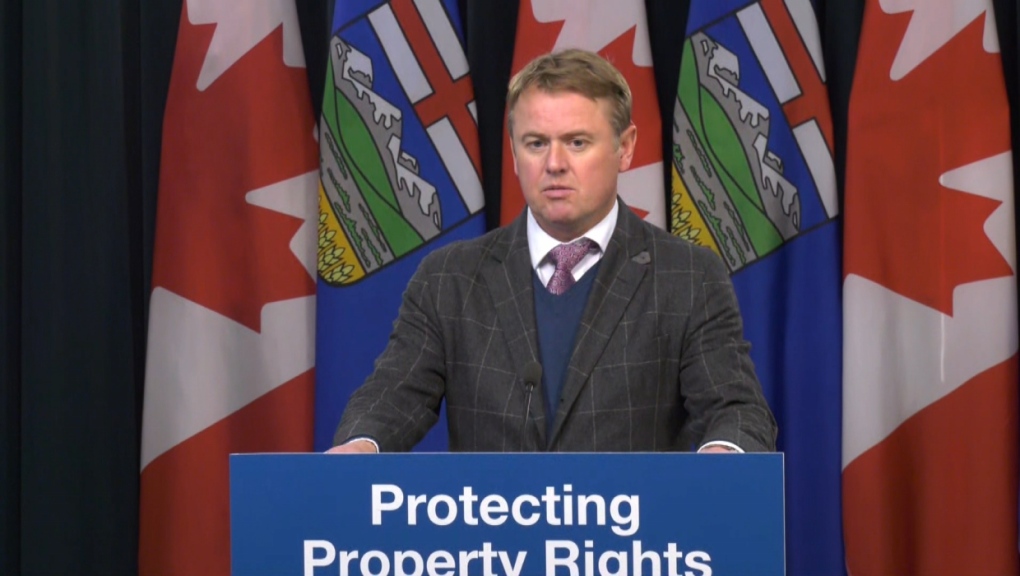UCP hopes to eliminate 'squatters rights' in Alberta
 Tyler Shandro says The Property Rights Statutes Amendment Act, 2022, would abolish the ability of squatters to make a claim and give private landowners the same protections once only reserved for government.
Tyler Shandro says The Property Rights Statutes Amendment Act, 2022, would abolish the ability of squatters to make a claim and give private landowners the same protections once only reserved for government.
Alberta's UCP government wants to get rid of the province's so-called "squatter's rights."
Minister of Justice Tyler Shandro announced the Property Rights Statutes Amendment Act, 2022, on Monday.
If passed, the bill would amend the Law of Property Act, the Land Titles Act and the Limitations Act, eliminating Alberta's adverse possession laws.
Currently, the laws allow a person who has occupied another person’s land for 10 years to claim ownership of that land. Claims can only be made against private landowners; public land, municipal land and irrigation districts are exempted.
"This is not the first time that a bill has been introduced in Alberta's legislature to abolish adverse possession," Shandro said Monday. "There have been previous attempts to make this change through private members bills, but none of them have been successful."
"I hope this time will be different, because Albertans have been saying that they want this change for over a decade."
Adverse possession laws have often been used in land disputes in rural areas, where property lines may be unclear.
"Possession" can mean anything from building a fence that cuts through someone else's property to actually living on someone's land.
Existing laws say anyone "occupying" someone else's land must be doing it visibly, excluding the actual land owner from using it, and the land owner must be aware of it.
"If passed, this act will bring peace of mind to Alberta's landowners, it will allow them to use and enjoy the land that they rightfully own without having to worry about whether someone can take it away," said Shandro.
"Updated legislation would send the clear message that there is nothing to be gained from squatting on someone's land."
CTVNews.ca Top Stories

MPP Sarah Jama asked to leave Ontario legislature for wearing keffiyeh
MPP Sarah Jama was asked to leave the Legislative Assembly of Ontario by House Speaker Ted Arnott on Thursday for wearing a keffiyeh, a garment which has been banned at Queen’s Park.
Mountain guide dies after falling into a crevasse in Banff National Park
A man who fell into a crevasse while leading a backcountry ski group deep in the Canadian Rockies has died.
2 teens charged in Halifax homicide: police
Two teenagers have been charged with second-degree murder in connection to an alleged homicide near the Halifax Shopping Centre earlier this week.
'Deep ignorance': Calls for Manitoba trustee to resign sparked after comments about Indigenous people and reconciliation
A rural Manitoba school trustee is facing calls to resign over comments he made about Indigenous people and residential schools earlier this week.
ByteDance prefers TikTok shutdown in U.S. if legal options fail, Reuters sources say
TikTok owner ByteDance would prefer to shut down its loss-making app rather than sell it if the Chinese company exhausts all legal options to fight legislation to ban the platform from app stores in the U.S., four sources said.
12-year-old hippo in Japan raised as a male discovered to be a female
When Gen-chan arrived at a zoo in Japan in 2017, no one questioned whether the then-five-year-old hippopotamus was a boy. Seven years later, zoo staff made a surprising discovery: Gen-chan, now 12, was female.
Here's why Harvey Weinstein's New York rape conviction was tossed and what happens next
Here's what you need to know about why movie mogul Harvey Weinstein's rape conviction was thrown out and what happens next.
Improve balance and build core strength with this exercise
When it comes to cardiovascular fitness, you may tend to focus on activities that move you forward, such as walking, running and cycling.
Legendary hockey broadcaster Bob Cole dies at 90: CBC
Bob Cole, a welcome voice for Canadian hockey fans for a half-century, has died at the age of 90. Cole died Wednesday night in St. John's, N.L., surrounded by his family, his daughter, Megan Cole, told the CBC.
































